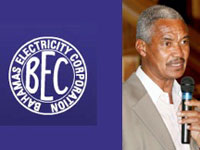 He was scheduled to arrive at Nassau 7:15 p.m. the evening of January 31 but was delayed by several hours, arriving instead 17 minutes past midnight as the first month of the New Year rolled into the second. His arrival in a new year on a new day in a new month foreshadowed a number of transitions in church and state.
He was scheduled to arrive at Nassau 7:15 p.m. the evening of January 31 but was delayed by several hours, arriving instead 17 minutes past midnight as the first month of the New Year rolled into the second. His arrival in a new year on a new day in a new month foreshadowed a number of transitions in church and state.
John Paul II arrived in The Bahamas in 1979 on the final leg of his first overseas journey outside of Italy as head of the Roman Catholic Church. He was, at just over three months, at the dawn of his papacy, in what would prove an extraordinary pontificate of approximately 27 years.
In his brief address at the Queen Elizabeth Sports Centre in the early hours of the morning of February 1, the pontiff highlighted two of the central principles of the Catholic Social Tradition, human dignity and the common good: “With the profound conviction of the surpassing dignity of the human person, may all the people of these islands make their individual and unique contributions to the common good that takes into account the personal rights and duties of all citizens…
“I ask God to lead you to the full achievement of your destiny. May he give to the people of The Bahamas rich and lasting blessings. May he assist the poor, comfort the sick, guide the youth, and bring peace to every heart.”
The Pope’s words were the proverbial mustard seeds delivered during a time of transition at home. Sir Milo Butler died just weeks before the papal visit. Bishop Paul Leonard
Hagarty, OSB, who came to The Bahamas in 1937 as a young priest, and who was first appointed by Pope Pius XII in 1951 as vicar apostolic of the Bahama Islands would resign as bishop of Nassau in 1981.
He was succeeded by Lawrence Burke, S.J., the first Caribbean man to lead the local church. Both prelates advanced the church’s educational and social apostolates, with the latter often speaking out on matters of social concern.
In October of 1979, the governing Progressive Liberal Party held its 24th annual convention. Perry Christie and Hubert Ingraham were at the beginning of their political careers. Christie was a newly minted Cabinet minister having been appointed in 1977, to be joined in Cabinet by Ingraham as minister of housing, national insurance and social service in 1982.
Mustard seeds
At the convention, Sir Lynden gave a lengthy address during which he noted that Pope John Paul II’s admonition inspired him to launch a “Social Revolution”. He invoked the mustard seeds of assisting the poor, guiding the youth, comforting the sick and bringing peace to every heart.
While the efforts of his subsequent governments did not exactly constitute a “social revolution”, there were important advances in social development. The PLP launched an impressive public housing program. The Grants Town Urban Renewal Project was introduced, a number of community clinics and schools were built, additional social assistance was granted for various groups, and the Ministry of Youth, Sports and Community Affairs introduced a variety of programs.
But tragically, the late 70s and the decade of the 80s were a dark period for the country with rampant drug trafficking and use, mass corruption by the Pindling government, and an attendant decline in positive social mores.
Sir Lynden’s PLP also failed to keep pace with the rapid urbanization of New Providence and increasing social dislocation and exclusion. Hubert Ingraham and the FNM’s contributions to social development are well-known and considerable.
Yet, in comparison to both Sir Lynden and Ingraham, Perry Christie’s contributions to various core issues of social justice have been abysmal. Christie has proven himself to be a paper progressive, long on rhetoric, short on action. Most progressives and arguably most Bahamians have come to expect little by way of Christie turning his grandiose rhetoric into reality.
Given a prior term to introduce National Health Insurance to relieve the suffering of thousands of Bahamians, Christie failed to do so. Now into his second term, Bahamians are being treated to more of the same banal and insipid rhetoric.
At the recent National Pride Day ceremony in Rawson Square commemorating the role played by various suffragettes and other women in national development, Christie offered his usual platitudes in a meandering speech filled with precious little that was substantive.
Constitutional question
Shockingly, mere weeks later, Christie uttered perhaps some of the most offensive remarks any head of government might give pertaining to equality for Bahamian women. His remarks excused his party’s failure to support a constitutional question making Bahamian women equal in law to men.
When asked by this journal whether the PLP’s stance on the 2002 referendum was a setback for women, Christie reportedly answered a dismissive, “No.” This, from the same man who attempted to wax eloquently a few weeks prior on women’s rights and the equality of women.
One can almost hear the subtext: we’ll get around to this at some point… no big deal. Once again Christie dragged out the lame excuse of the process as to why his party campaigned against the various questions in the referendum.
He admitted that he was not opposed to the question granting women greater constitutional equality. He just didn’t like the process, as there needed to be more consultation with the church. How this mantra of process plays out on the proposed referendum on gambling should prove interesting. Nevertheless, where have we heard before this excuse about process?
Dr. Martin Luther King Jr. was continuously confronted by Christian ministers as to why he moved so quickly in demanding various and immediate civil rights for black Americans. Why not delay your demands for equality, engage in more process and consult more widely, Dr. King was often asked.
He answered in his classic “Letter from a Birmingham Jail” and in many other writings that the time to do the right thing was always now. He had disdain for those who argued process as an excuse to delay justice for others, insisting on the fierce urgency of now. He demanded in “I Have a Dream”: “We have also come to this hallowed spot to remind America of the fierce urgency of Now. This is no time to engage in the luxury of cooling off or to take the tranquilizing drug of gradualism. Now is the time to make real the promises of democracy.”
Social justice
Christie’s PLP could have said to churches and the Bahamian people, in the spirit of the suffragettes and other champions of social justice, that by 2002 it was more than enough time to grant Bahamian women greater equality.
The majority of PLP parliamentarians sensed this when they voted for the questions in the House. The betrayal of the women’s rights movement came later in the interest of winning office.
This was not one of the finest moments of the party of those heroes and heroines of the struggle for majority rule and female equality. Nor was the period from 2002 to 2007, when Christie and his party could have reintroduced the question, but never did.
As he signed the Civil Rights Bill of 1965, President Lyndon Johnson predicted, correctly, that its passage would cost the Democratic Party the South. But, Johnson chose to make history rather than delay justice.
Concerning principles like human dignity and the common good, the great men and women of history, given an opportunity to advance the cause of social justice, choose the path of progress and inclusion, even at risk to their contemporary fortunes.
Then there are those, who, though given an opportunity to lead and to achieve great things, are more content to talk into the sunset while making excuses for their historic failures.
By: Simon – Front Porch
Source: The Nassau Guardian



